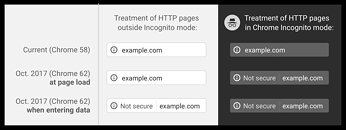Raevenlord
News Editor
- Joined
- Aug 12, 2016
- Messages
- 3,755 (1.22/day)
- Location
- Portugal
| System Name | The Ryzening |
|---|---|
| Processor | AMD Ryzen 9 5900X |
| Motherboard | MSI X570 MAG TOMAHAWK |
| Cooling | Lian Li Galahad 360mm AIO |
| Memory | 32 GB G.Skill Trident Z F4-3733 (4x 8 GB) |
| Video Card(s) | Gigabyte RTX 3070 Ti |
| Storage | Boot: Transcend MTE220S 2TB, Kintson A2000 1TB, Seagate Firewolf Pro 14 TB |
| Display(s) | Acer Nitro VG270UP (1440p 144 Hz IPS) |
| Case | Lian Li O11DX Dynamic White |
| Audio Device(s) | iFi Audio Zen DAC |
| Power Supply | Seasonic Focus+ 750 W |
| Mouse | Cooler Master Masterkeys Lite L |
| Keyboard | Cooler Master Masterkeys Lite L |
| Software | Windows 10 x64 |
As part of Google's push towards a safer, HTTPS-encrypted web, the Chrome browser will begin marking any HTTP site as non-secure when a user browses in incognito mode. Incognito is the Chrome browser's enhanced privacy mode, which goes a long way in explaining why Google sees non-HTTPS sites as a non-secure place to visit. Save some network metadata, encrypted HTTPS connections keep the contents of the communications between the user and a web server hidden from outside parties - in normal circumstances, that is. The company is already marking HTTP web-pages that accept credit card details as not-secure, and starting October this year, the browser will do the same on every HTTP site in which the user has to input data, and for every HTTP page browsed in Incognito mode.
Interestingly, Google has advanced that traffic to pages it has marked "Not Secure" has dropped by 23%, which goes to show that such policies do impact a user's decision on whether or not to establish such a connection. In addition, Google started scrambling its search engine algorithm so as to feature HTTPS sites more prominently than sites that don't. This means that websites that see diminishing visitors should be more inclined towards a adopting the more secure, encrypted HTTPS. And in an era where every scrap of our information is deemed worthy of at least being stored and resold, I find it commendable that Google thinks every piece of information should be secured, instead of just our payment information - which even that isn't always secure.


View at TechPowerUp Main Site
Interestingly, Google has advanced that traffic to pages it has marked "Not Secure" has dropped by 23%, which goes to show that such policies do impact a user's decision on whether or not to establish such a connection. In addition, Google started scrambling its search engine algorithm so as to feature HTTPS sites more prominently than sites that don't. This means that websites that see diminishing visitors should be more inclined towards a adopting the more secure, encrypted HTTPS. And in an era where every scrap of our information is deemed worthy of at least being stored and resold, I find it commendable that Google thinks every piece of information should be secured, instead of just our payment information - which even that isn't always secure.


View at TechPowerUp Main Site






